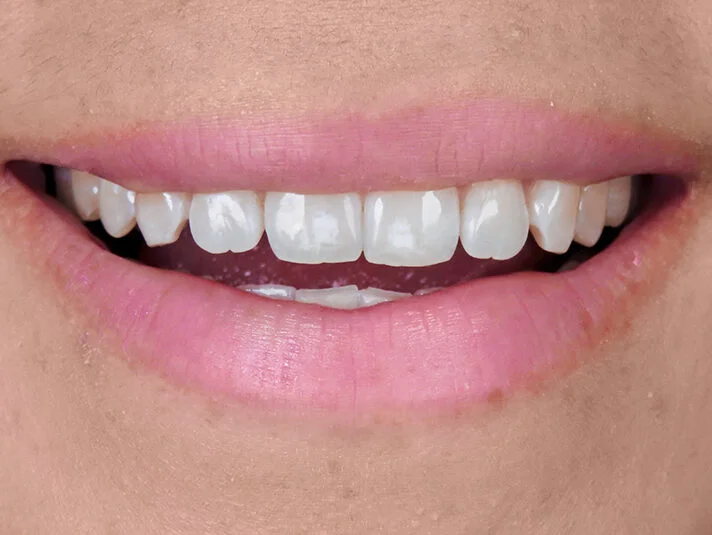Porcelain Crowns
Porcelain crowns can restore the natural form, function, and appearance of teeth that have been badly damaged. Whether the health of your tooth has been compromised by trauma or extensive decay, our Las Vegas dentists can create a custom porcelain crown to beautifully rebuild and strengthen your tooth. Our advanced dental imaging technology allows our dentists to precisely design restorations that offer a superior fit and high-quality esthetics.
- What Are Porcelain Crowns?
- Porcelain Crowns Benefits
- Porcelain Crowns Candidates
- Porcelain Crowns vs. Porcelain Veneers
- Porcelain Crowns Lifespan
- Porcelain Crowns Procedure
- Porcelain Crowns Results
- Porcelain Crown Care
- Porcelain Crown Alternatives
- Selecting a Dentist for Porcelain Crowns
- Porcelain Crowns Cost
- Additional Porcelain Crowns FAQs
“Thank you True Dentistry! You got my dad into your office and recemented his crown. My dad feels and looks Great!”
What Are Porcelain Crowns?
A dental crown is a meticulously crafted restoration that is placed over a vulnerable tooth to protect and enhance its strength and structure. Crowns can be used to repair chipped, cracked, broken, or decayed teeth that require extensive restoration. Highly versatile, they can serve to restore a single tooth, be fabricated to top dental implants with a natural-looking tooth replacement, complete a root canal procedure, or act as replacement teeth for a dental bridge. At True Dentistry, we utilize state-of-the-art technology to design our beautiful porcelain restorations.

What Are The Benefits of Porcelain Crowns?
Porcelain crowns from our practice can offer the following advantages:
- Beautiful, natural-looking results
- Healthy tooth material is saved with conservative treatment
- Customized fit is achieved using precise digital dental scans
- The color and dimensions of your natural tooth are precisely matched
- Restorations are fabricated from durable, stain-resistant, metal-free ceramic material

How Long Do Porcelain Crowns Last?
When placed by a highly qualified cosmetic dentist, porcelain crowns are extremely durable and can often last at least a decade with the proper care. They are more likely to last many years into the future if you practice excellent oral hygiene and exercise caution when biting down on hard foods. That said, in order to keep your crowns functioning optimally, be sure to brush and floss regularly and attend your biannual routine exams.
What Can I Expect During the Porcelain Crown Procedure?
One of our dentists will first treat any disease or decay present in the affected tooth, completing a root canal procedure if necessary. Once all damage, disease, and decay have been removed, they will ensure the tooth is fully prepared to accommodate a crown. They will then take a digital impression and enter the data into our dental imaging software to custom-design your new crown. Next, the design will serve as the blueprint to craft your new crown from precisely color-matched porcelain material. During your next visit, the dentist will place the crown over your tooth to check the fit and make any necessary adjustments. Once they are satisfied with the fit, he or she will cement the crown in place to create a long-lasting bond.
What Results Can I Expect With a Porcelain Crown?
The majority of patients who choose porcelain crowns from our practice are impressed with the convenience and high-quality results we provide. With proper daily hygiene and regularly scheduled dental exams, porcelain crowns can last for decades. To see examples of the smile transformations that we have achieved for our patients, we invite you to view before and after photos of our work.

How Should I Care for My Dental Crowns?
Caring for dental crowns is much like caring for natural teeth. To keep your crown strong and long-lasting:
- Brush twice daily with a soft-bristled toothbrush
- Floss carefully around the crown to protect gums and edges
- Use an antibacterial mouthwash to support gum health
- Avoid chewing on hard objects like ice, pens, or fingernails
- Limit sticky or overly hard foods that can damage the crown
- Schedule regular dental check-ups and professional cleanings
With good oral hygiene and healthy habits, dental crowns can remain strong, functional, and attractive for many years.
Are There Alternatives to Dental Crowns?
Dental crowns are one of many effective restorative treatments, but for some dental conditions, a crown may not be necessary to achieve optimal results. For instance, in some cases, if the structure of a tooth is compromised to a lesser degree of severity, a porcelain veneer may be a sufficient restorative option. Additionally, those who have concerns that are more aesthetic in nature may benefit from treatments such as teeth whitening or cosmetic bonding, depending on their specific needs. Our dentists can talk with you about any alternatives to dental crowns that may be appropriate once your dental exam has been performed.
How Much Do Porcelain Crowns Cost?
While the national cost of porcelain crowns can range from $697 to $1,3991, the final price will depend on several factors, including:
- The number of restorations
- Materials used to create the crowns
- Whether associated treatments (i.e. dental implants, bridges, root canal therapy, or others) were part of the treatment plan
- The location of the affected teeth
- Whether sedation dentistry techniques are utilized
You will receive a detailed cost quote for your porcelain crown treatment after your consultation. In the meantime, please explore our dental financing options, which we have developed in order to make the payment process as stress-free as possible for each patient. Not only do we accept all major credit cards, but we work with two healthcare financing programs, LendingClub® and CareCredit®, to help eligible patients set up installments or other specialized payment plans.
Additional Frequently Asked Questions About Porcelain Crowns
Will my dental crowns look natural?
When performed by a qualified and experienced dentist, the dental crown procedure can result in natural-looking restorations. Advancements in materials, technology, and techniques have led to crowns that can match the color, shape, and feel of existing teeth so precisely that they are virtually indistinguishable from natural teeth.
Are porcelain crowns painful?
The porcelain crown procedure is generally not an excessively painful experience for our patients. The area around the tooth can be numbed with a local anesthetic to minimize discomfort during the process. Some sensitivity or mild discomfort may occur after the anesthetic wears off, but this is usually manageable with over-the-counter pain medication and should not last long.
Can porcelain crowns be whitened?
Porcelain crowns cannot be whitened like natural teeth since they are designed to be stain-resistant. This means that they will also be resistant to traditional whitening treatments. To achieve a refreshing blend with surrounding teeth, we may recommend a whitening treatment before the dental crown procedure so the crown can be color-matched to the new shade. You can help maintain the color of your crown by adhering to a regular oral hygiene routine and limiting intake of foods and beverages that contain staining agents, as well as by avoiding tobacco products.
Can I eat normally after getting dental crowns?
Yes, you should be able to eat normally after getting dental crowns, but it is advised to wait until the local anesthetic wears off in order to avoid biting your tongue or cheek. Initially, you might want to stay away from very hard or sticky foods to ensure the crowns settle properly. After a short adjustment period, you should be able to enjoy most of your favorite foods without issues, although being cautious with extremely hard foods is recommended.
How do I know if I need a crown or just a filling?
The need for a crown or filling generally depends on the extent of tooth damage. A tooth-colored filling is usually sufficient for small to moderate cavities or minor repairs, restoring the affected area while preserving most of the natural tooth. A crown is often recommended when a tooth is severely decayed, cracked, weakened, or has a large filling that compromises its strength. One of our dentists can evaluate the size, location, and condition of your affected tooth to recommend the best option for improving function and maintaining long-term dental health.
What are the differences between a crown and an inlay and onlay?
Crowns, inlays, and onlays can all restore damaged teeth but differ in coverage. A crown fully covers the entire tooth, providing strength and protection for severely weakened or decayed teeth. Inlays fit within the grooves of the tooth’s chewing surface, while onlays extend over one or more cusps, covering a larger area. Inlays and onlays typically preserve more of the natural tooth structure than crowns and may be ideal for moderate damage.
Contact True Dentistry
If you are interested in porcelain crowns, we encourage you to contact our office to schedule a consultation with one of our dentists.
Medical Resource
1CareCredit® – How Much Do Dental Crowns Cost? Pricing and Insurance Guide



















